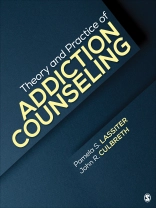This one-of-a-kind text brings together contemporary theories of addiction and helps readers connect those theories to practice using a common multicultural case study. Theories covered include motivational interviewing, moral theory, developmental theory, cognitive behavioral theories, attachment theory, and sociological theory. Each chapter focuses on a single theory, describing its basic tenets, philosophical underpinnings, key concepts, and strengths and weaknesses. Each chapter also shows how practitioners using the theory would respond to a common case study, giving readers the opportunity to compare how the different theoretical approaches are applied to client situations. A final chapter discusses approaches to relapse prevention.
Cuprins
From Treatment Lore to Theory Application: An Introduction to Addiction Theory and Practice – John R. Culbreth, Pamela S. Lassiter
Treatment Lore
Overview of Book Sections and Chapters
Addiction Counseling Case Study
Appendix A
Historical Perspectives and the Moral Model – Pamela S. Lassiter, Michael S. Spivey
Colonial Era (1492 – 1763)
American Revolution & Young Republic (1763 – 1820s)
Temperance Movement (1826 – 1919)
Prohibition (1919 – 1933)
World War II Era (1939 – 1945)
Nixon Era (1969 – 1974)
Carter Era (1977 – 1981)
Reagan Era (1981 – 1989)
The 1990s and 2000s
Cultural Views of Addiction
Basic Tenets of the Moral Model
Strengths and Weaknesses of the Theory
Influences on Social Policy
Influences on Clinicians
Case Study Responses
Summary
Biological Theory-Genetics and Brain Chemistry – Kathleen Brown-Rice, Regina Moro
Overview of Empirical Research Findings on the Addictive Process
Basic Tenets of the Theory
Philosophical Underpinnings and Key Concepts of the Theory
Addictive Substances
How the Theoretical Approach is Utilized by Practitioners
Assessment and Prevention Implications
Strengths and Weaknesses of the Theory
Case Study Response
Summary
Appendix
Psychoanalytic Theory of Addiction – Leigh F. Holman
Basic Tenets of the Theory
Philosophical Underpinnings and Key Concepts of the Theory
How the Theoretical Approach is Utilized by Practitioners
Assessment and Prevention Implications
Strengths and Weaknesses of the Theory
Case Study Responses
Summary
Self-Psychology Theory: Addiction and the wounded self – Joseph B. Cooper
Philosophical underpinnings and key concepts of the theory
How the theoretical approach is utilized by practitioners
Assessment and prevention implications
Strengths and weaknesses
Case Study
Summary
A Developmental Approach to Addiction Theory and Treatment – Amy Williams, Rick Gressard
Common Elements of Developmental Theories
Overview of Selected Developmental Theories
Practitioner Uses and Applications to Addiction Counseling
Applications and Implications for Prevention, Assessment, and Treatment of Substance Use Disorders
Strengths and Weaknesses of Developmental Theories
Case Study Responses
Summary
Attachment Theory – Leigh F. Holman, Rebecca G. Scherer
Basic Tenets of the Theory
Philosophical Underpinnings and Key Concepts of the Theory
How the Theoretical Approach is Utilized by Practitioners
Assessment and Prevention Implications
Strengths and Weaknesses of the Theory
Case Study Responses
Summary
Sociological Theory – Katie A. Lamberson
Brief History of Sociological/Cultural Influences on Addiction, Including Differences Between the U.S. and Other Parts of the World
Basic Tenets of the Theory
Philosophical Underpinnings and Key Concepts of the Theory
How the Theoretical Approach is Utilized by Practitioners
Assessment and Prevention Implications
Strengths and Weaknesses of the Theory
Case Study Responses
Summary
Family Systems Theory – Simone F. Lambert, Heidi Unterberg, and Marsha Riggio
Basic Tenets of the Theory
Philosophical Underpinnings and Key Concepts of the Theory
How the Theoretical Approach is Utilized by Practitioners
Children and Adolescents
Trauma
Strengths and Weaknesses of the Theory
Case Study Responses
Summary
Transtheoretical Model for Change – Daniel Gutierrez, Astra Czerny
Basic Tenets of the Theory
Philosophical Underpinnings and Key Concepts of the Theory
How the Approach is Utilized by Practitioners
Termination
Counselor’s Stance
Assessment Implications
Strengths and Weaknesses of the Theory
Case Study Responses
Summary
Motivational Interviewing in the Treatment of Substance Abuse and Dependence – Todd Lewis
Basic Tenets of Motivational Interviewing
Philosophical Underpinnings and Key Concepts of the Theory
Assessment and Prevention Implications
Strengths and Weaknesses of the Theory
Case Study Responses
Summary
Harm Reduction: Meeting Clients Where They Are – Regina R. Moro, Jana Burson
Basic Tenets of the Theory
Philosophical Underpinnings and Key Concepts of Harm Reduction
How the Theoretical Approach is Utilized by Practitioners
Assessment and Prevention Implications
Strengths and Weaknesses of the Theory
Case Study Responses
Summary
Cognitive Behavioral Approaches to Addiction Treatment – Ed Wahesh
Basic Tenets of the Theory
Philosophical Underpinnings and Key Concepts of the Theory
How the Theoretical Approach is Utilized by Practitioners
Assessment and Prevention Implications
Strengths and Weaknesses of the Theory
Case Study Responses
Summary
Twelve-Step Facilitation – Jeremy M. Linton
Basic Tenets of the Theory
Philosophical Underpinnings and Key Concepts of the Theory
How the Theoretical Approach is Utilized by Practitioners
Assessment and Prevention Implications
Case Study Responses
Summary
Constructivist Approaches to Addiction Counseling: Feminist, Womanist, and Narrative Theories – Pamela S. Lassiter, Anneliese A. Singh
Feminist and Womanist Theories of Addiction Counseling
Narrative Approaches to Addiction Counseling
Feminist Theory Case Study Response
Womanist Theory Case Study Response
Narrative Theory Case Study Response
Summary
Behavioral Addictions – Craig S. Cashwell, Paula J. Swindle
Behavioral Addictions
Cultural Issues in Behavioral Addictions
Case Study Responses
Summary
Theory and Practice of Group Work with Addictions – Melanie M. Iarussi
A Brief History of Group Work in Addictions Treatment
Key Concepts and Theoretical Underpinnings of Group Work in Addiction Treatment
Group Work in Practice
Types of Group Treatment
Strengths and Weaknesses of Group Work with Addictions
Case Study Responses
Approaches to Relapse Prevention – Amanda L. Giordano, Elliott S. Woehler
Basic Tenets of Approaches to Relapse Prevention
Philosophical Underpinnings and Key Concepts of Relapse Prevention
How Approaches to Relapse Prevention are Utilized by Practitioners
Assessment and Prevention Implications
Strengths and Weaknesses of Approaches to Relapse Prevention
Case Study Responses
Summary
Appendix A
Despre autor
John Culbreth, Ph D, is a leading national trainer in the field of clinical supervsion, who received superior evaluations for his workshops at the WAAODA Conference earlier this year. Dr. Culbreth is an assistant professor and coordinator of the community counseling program in the Department of Counseling at the University of North Carolina at Charlotte. He received his doctorate in Counseling and Counselor Education from the University of North Carolina at Greensboro in 1996 and has held teaching positions at Pennsylvania State University and the University of Virginia. As a faculty member and researcher, Dr. Culbreth has specialized in issues of clinical supervision that are unique to the chemical dependency counseling field and the development process for new and experienced clinical supervisors. Dr. Culbreth′s clinical experience includes work in treatment settings as a mental health counselor, chemical dependency treatment counselor, substance abuse prevention counselor, and in the school setting as a student assistance program coordinator and intervention counselor. He holds licenses as a professional counselor and as a chemical addiction specialist in North Carolina and is a Nationally Certified Counselor with Addiction Counselor and Clinical Supervisor pecialty certifications












